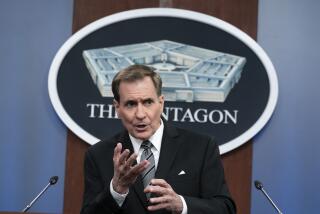Afghan officials linked to attack on U.S. soldiers
- Share via
KABUL, AFGHANISTAN, AND ISTANBUL, TURKEY — A U.S. military report released Thursday says at least two local Afghan officials were believed to have colluded in a July attack by insurgents on a remote outpost in eastern Afghanistan that killed nine U.S. soldiers.
It was the largest loss of American troops’ lives in a single land battle since the start of the war in Afghanistan in 2001. The intense, hours-long assault by an estimated 200 Taliban fighters, during which the lightly manned outpost was nearly overrun, also left 27 U.S. soldiers and four Afghan troops injured.
The July 13 attack illustrated the challenges faced by coalition troops deployed at small outposts in rugged, desolate areas of Afghanistan.
As a matter of policy, U.S. forces seek to cultivate contacts with residents near their bases and outposts. At the same time, the troops are well aware that villagers and Afghan officials are vulnerable to intimidation by insurgents and may provide information that will help the militants.
Divided loyalties also can be an issue, as has been shown in several recent attacks on American troops by members of the Afghan security forces.
The internal military investigation of the July attack on the base near the village of Wanat, in Nuristan province, concluded that the district police chief and the district governor had aided the insurgents who staged the assault, and recommended that they be removed from their posts and perhaps prosecuted.
But a military statement accompanying the report noted that “ultimately Afghanistan is a sovereign nation, and the U.S. military neither appoints or removes government officials.”
Afghanistan’s Defense Ministry declined to comment on the findings, as did provincial officials in Nuristan. It was not clear whether any action against the officials in question was pending.
The 20-page document, written by an unidentified Army colonel, was declassified so the military could give a full accounting of events to the families of the slain soldiers, officials said. Details of the review were reported this week by the New York Times, and a redacted version of the report was made public Thursday.
Soldiers posted at the small base had received repeated warnings of an imminent attack, the report says, but the investigation did not fault them for any lack of preparedness. It says commanders had anticipated a possible “probing” attack, the typical pattern in such instances, rather than the large-scale and well-coordinated frontal assault that occurred.
The outpost had been in place only five days and fortifications were still being built when it was hit. Forty-eight American troops and 24 Afghan army soldiers were posted there at the time.
The report describes a withering assault in which some of the Americans’ most effective weapons, including a missile launcher, were disabled within moments. The U.S. forces used artillery and attack helicopters to drive back the insurgents, but the fighting lasted more than four hours.
In strikingly frank language, the report faults the “incredible amount of time” taken to negotiate the site of the outpost with local authorities, about 10 months in all. Although such talks are aimed at heading off any affront to local sensitivities, the investigation concluded that it gave insurgents time to plan a complicated, multi-pronged attack.
“Right now, the [negotiating] system is broken,” the report says.
The report also says troops in the outpost were unaware that on the evening of July 12, shortly before the overnight assault began, villagers had fled, apparently on insurgents’ orders. Homes and the village mosque were then used as firing positions.
Also Thursday, reports surfaced of civilian casualties during fighting between Western forces and insurgents in northwestern Afghanistan. The police chief in the Ghormach district of Badghis province said seven civilians were killed, along with 15 militants, in an airstrike by North Atlantic Treaty Organization forces.
A day earlier, the U.S.-led coalition announced that it was investigating claims that dozens of civilians at a wedding party in Kandahar province were killed in an errant airstrike this week. American officials said that there was fighting in the area at the time and that insurgents had forced residents to remain in the area.
That incident drew a plea from Afghan President Hamid Karzai, directed at President-elect Barack Obama, to put an end to civilian deaths.
--
More to Read
Sign up for Essential California
The most important California stories and recommendations in your inbox every morning.
You may occasionally receive promotional content from the Los Angeles Times.









